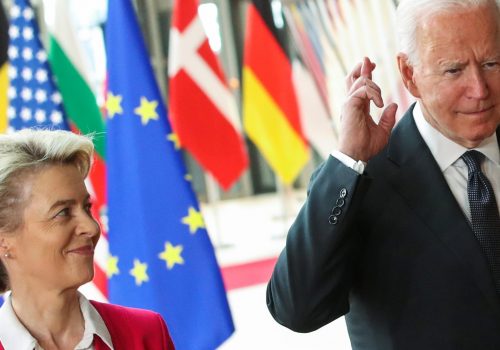FAST THINKING: Biden just held the biggest gathering of democratic world leaders ever. What are the results?
GET UP TO SPEED
Was this the shot in the arm democracy needs? This week US President Joe Biden pulled together more than one hundred global participants from government, civil society, and beyond for a two-day virtual Summit for Democracy. Among the outcomes was a $424 million US commitment to fight corruption and help independent media. But now comes the hard part: Putting in the work to prove that democracy isn’t dying out. Our experts—former US government officials with frontline democracy experience—share their insights on what to make of the big event and what to expect next.
TODAY’S EXPERT REACTION COURTESY OF
- Rose Jackson (@Rosejackson3): Director of the Democracy & Tech Initiative at the Digital Forensic Research Lab and former State Department official
- Graham Brookie (@GrahamBrookie): Senior director of the Digital Forensic Research Lab and former White House official
- Ash Jain (@ashjain50): Director for democratic order at the Scowcroft Center for Strategy and Security and a former member of the secretary of state’s policy planning staff
Connective tissue
- The great hope for this week’s gathering, says Rose, who worked with the Biden administration to shape its agenda for the summit, was to get democracies to “grapple with the very real challenges they each face at home and around the world. That means, in particular, working on issues that are so interlinked they can’t be defined as just ‘foreign’ or ‘domestic.’”
- Two interlinked areas stand out: corruption and technology. Rose says the administration “nailed it” on the former, after putting out a well-regarded anti-corruption strategy. But she thinks the latter was a “missed opportunity” despite the administration’s “excellent effort to limit the export of surveillance-tech to autocrats.” Why? “Knowing something is important and knowing what to do about it are two different things.”
- What democracies should do about it, Graham says, is pursue three priorities for the coming year: “to counter authoritarian tech use, drive down a dangerous variance in tech policy approaches among allies and partners, and produce coherent domestic approaches to technology.”
Subscribe to Fast Thinking email alerts
Sign up to receive rapid insight in your inbox from Atlantic Council experts on global events as they unfold.

Eye on Beijing
- The most significant part of the summit, in Ash’s view, was not what happened during the series of virtual meetings, but rather how China reacted to it. The gathering “seems to have rattled Beijing, not just because it included Taiwan, but because the themes at the heart of the summit—democratic governance and shared values—run very much against Beijing’s worldview.”
- The Chinese government held its own counter-summit and launched a PR campaign against the United States. And Graham notes how “China’s terse reaction was matched with an increase in coercive influence operations, which has been referred to as ‘wolf warrior’ diplomacy or part of the country’s discourse power strategy.”
- The Chinese reaction is a sign, Ash says, of how Biden’s democracy-versus-autocracy framing is increasingly taking hold among US allies and partners. “If democracies do find ways to enhance cooperation, it would undermine China’s efforts to use coercive pressure against smaller states on which it has undue influence—such as Lithuania, whose president spoke at the summit,” he points out.
Lights, camera, action
- With the summit wrapped, so begins the so-called “year of action” ahead of an in-person gathering slated for next December, where Rose wants to see civil-society leaders involved more in the planning. She’s also eager to “build on initial rumblings in the White House on a major effort to rally the world’s democracies around a free and open digital world.”
- Two things that were lacking at this year’s summit and need to be rectified, Graham says, are a “widespread public awareness or consensus on the urgent democratic crisis many countries face at home, especially the United States” and leaders such as a State Department assistant secretary for democracy, whose confirmation has been held up in the Senate for nearly eight months.
- Ash lays out three signposts for how democracies can make the next year a success: “Adopt a global democratic charter” along the lines of last summer’s US-UK charter, “select two or three core issues to drive summit action” such as pushing back on autocratic coercion or dealing with democratic backsliding, and “explore ways to formalize a network of democracies.”
Further reading
Thu, Dec 9, 2021
Biden’s democracy summit should produce a transatlantic anti-corruption strategy
New Atlanticist By Ben Judah
The Biden administration's impressive new corruption strategy should inspire the UK and EU to join in.
Wed, Dec 8, 2021
Democracy in Latin America is under threat. These two summits are a chance to fix it.
New Atlanticist By
As nations across the Americas come together to address their shared shortcomings, here's a roadmap to help bolster their democratic institutions.
Tue, Dec 7, 2021
Biden’s Summit for Democracy
Strategic Insights Memo By Ash Jain
Over the past several months, the Atlantic Council’s Scowcroft Center for Strategy and Security has organized a series of private workshops with official and experts from leading democracies, including the D-10, to discuss the Biden administration’s plans for a Summit for Democracy. This memo provides some insights and recommendations for summit plans going forward.
Image: U.S. President Joe Biden convenes a virtual summit with leaders from democratic nations at the State Department's Summit for Democracy, at the White House, in Washington, U.S. December 9, 2021. REUTERS/Leah Millis TPX IMAGES OF THE DAY


